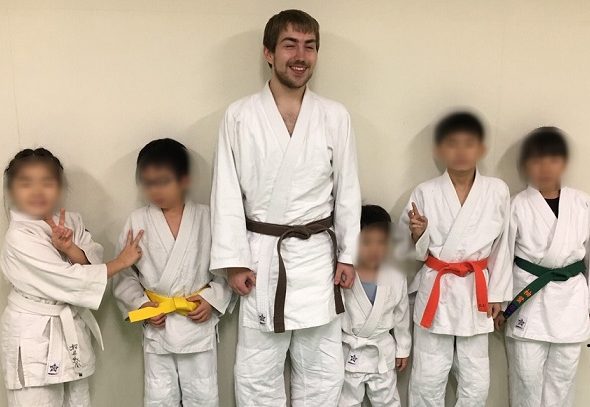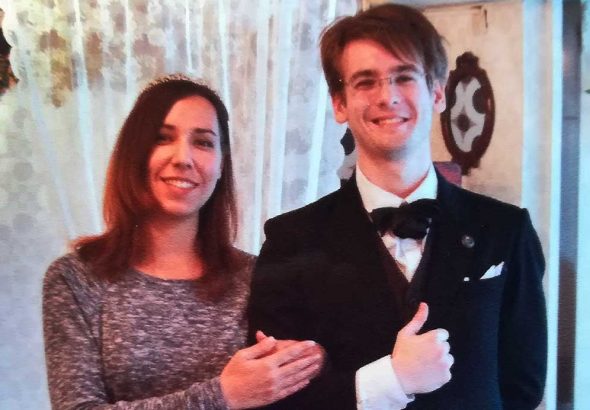Monthly Archives: December 2017
- all
- Pop Culture
- Preparation
- Time in Japan
- Tokyo Things To Do
- Travelling
- Working

Alexander S. (19) from Germany tells us about his Working Holiday experience in a dojo in Tokyo. He has already a lot of experience as a judoka and has been working as a judo instructor in Germany. Now he got the terrific chance to work in the country where judo originated and learn the trade from actual Japanese instructors. He now works as one of the trainers of a kids' class. Alexander, how did you find this job? It's an interesting story. I was actually interviewing for a restaurant job, and it so happened that a few sport companies were also having a meeting in the restaurant at the same time. Since I wrote on my CV that I have practiced judo for many years, I was invited by one of the organizers to join the meeting and I got offered this job afterwards. I was indeed very lucky. When do you work? I work at the dojo twice a week, usually Wednesdays and Fridays. The kids' training program is from 4.30pm to 6pm, and then I join the adult training hours. Sometimes one of the children receives a private training, during which I assist as a second trainer. What do you find challenging about this job? My Japanese level is very low. All my knowledge comes from a 2-week crash course I took in Germany. I am lucky that the other trainers speak a bit of English, and I even teach in English on Fridays. The school offers this special program where we try to teach the children some English while they train, so they gain more than just the physical abilities. I actually already knew quite a few judo terms in Japanese as I learned them while I was training in Germany. If there is something I can't explain using language, I just show them what I mean. So it turns out the skill that is actually most important for this job is my judo ability, and not my (Japanese) language ability. Does this job help you improve your Japanese? Yes, absolutely. I even come a little early to talk to the children sometimes. Sometimes I also study Japanese between trainings. I just bring my study books to the dojo and if I have questions there is always someone to help and advice me. What did you learn doing this job? Besides my Japanese, my English has improved as well. I have to communicate a lot in both languages so I slowly get better. Other than this I learned a lot in the adults training and improved my judo skills. This will be very useful for when I go back to work as a judo instructor in Germany again. Do you enjoy the job and are there things you don’t like? To be honest, there is nothing I don't like about this job. I like every aspect about it. It combines well with my other job at the former mentioned restaurant. It helps me balancing my weekly schedule and I stay physically fit. We have a lot of fun during the training and I gain experience. It's just the perfect combination of jobs. How much do you earn? Is it enough to cover your living expenses? I earn 1000 yen per hour and work only 2 days a week. This is fine, but of course not enough to cover my expenses. I really need the other job in the restaurant where I work 8 hours a day, 3 days a week. With these 2 jobs together I make enough to live in Tokyo and I still have enough time for private activities and trips. What brought you to Japan in the first place? I'm sure my answer will not be a surprise to many, but I have to admit it has to do with anime. Watching anime and reading manga made me curious about Japan and now I can experience the culture first hand. Would you recommend Japan for a Working Holiday? Yes, I would recommend it. Most people choose Australia and New Zealand for a Working Holiday, but I think Japan is still special and relatively unknown. There's a whole new culture to explore and I have learned so many interesting things already. It's absolutely great to spend some time in Japan in this way, working here gives me a new perspective. The language barrier might be higher than in other countries, but it wasn't as hard as I first expected. A lot of people in Tokyo can actually speak some English, and even if they don't, many people try hard to help you using just gestures and the few English words they know. " order_by="sortorder" order_direction="ASC" returns="included" maximum_entity_count="500"]

We visited Marcel S. (19) at the Butler Café in Tokyo where he has been working for a few weeks now. We had a great time and enjoyed being entertained by three charming butlers! It wasn't just the service that made it worth going, we were also surprised by the delicious dishes they served us. Afterwards we interviewed our Working Holiday butler from Germany about his experience working for the Butler Café. Marcel, how did you find this job? I found it on the internet. Someone of my share house mates told me that there is a great website for foreigners to find jobs like this in Japan. This job was actually the first one I applied for, and it worked out well. Since when have you been working at the Butler Café and what are your general working hours? I've been working here for almost 4 weeks now and I hope I can stay here for a few more months. The working hours depend on the day, for weekdays I'd say the average working time is about 3,5 hours per shift, but in the weekend I'm working up to 7 or 8 hours. We arrange the work schedule according to the number of reservations we receive online. What requirements came with the job? Obviously you have to be kind if good-looking in the employers eyes. The first thing they check when you apply is your photo, then they want to know whether your English conversation skills are strong enough. Since you only speak English during the job, it is mandatory to speak an advanced level of English. Another condition I heard of is 'looking foreign', as they prefer western butlers in order to create a 'European butler atmosphere'. So most of the employees are from Europe. It's also an advantage to be a good actor as the way you're expected to behave as a butler is quite different from what you would normally behave like. And then probably the most important requirement is that you should actually enjoy doing this job. You should not just do this job for the money. How much do you earn? Is it enough to cover your living expenses? I earned 1,000 Yen per hour until now, because that is what everyone gets in the first month. After you complete your training you can earn up to 1,500 Yen per hour, depending on your skills and popularity with the customers. What are your duties at the Butler Café? My first and most important duty is to entertain the princesses, this is how we call our customers. If they feel good and enjoy the time they spend here, we are doing a good job. I have to serve food and tea, have a little chat with them and if they want to we offer the extra service of taking a picture together. I adopted a stage name by the way, my butler name is Alfred because that is seen as one of the typical European butler's names. Do you enjoy this job? Are there things you don’t you like about it? Of course I'm enjoying this job. I have always been into acting and now I get even paid for it. I feel very lucky that I can actually do something for a living in Japan that I also enjoy. The only unfortunate thing about this job is that I can never get in touch with the customers after they leave our café. This is a strict rule, as it helps keeping the fantasy alive. Do you think working for the Butler Café improves your Japanese? What else did you learn? We communicate in English with the customers as well as with the owner, so if someone want to improve their Japanese this might be the wrong job. My Japanese level hasn't really improved since starting work here. What has improved are my intercultural communication skills. Trying to understand people who barely speak your language is hard in the beginning. I have been able to communicate using English, gestures and a little bit of Japanese, and it has surprised me how much I am actually able to get across without having a language in common. What brought you to Japan in the first place? Japan is a country with a unique culture that has always fascinated me. Besides Japanese culture being very different from German culture, I actually see things we have in common as well when it comes to the way we think. The cultural aspect was actually the main reason I decided to go to Japan. I wanted to visit hot springs, eat sushi and learn the language using it in real life. Japan is a country that has so much to offer that I would gladly stay here longer. If there wasn't any language barrier I could imagine living here for several years. Would you recommend a Working Holiday in Japan? Very much so, Japan is a country where everyone should have been at least once in their life. I would recommend coming here either for a Working Holiday or just to travel. The people are friendly, it's extremely safe because of the low crime rate, and with a little bit of luck you can find a job you like! " order_by="sortorder" order_direction="ASC" returns="included" maximum_entity_count="500"]
